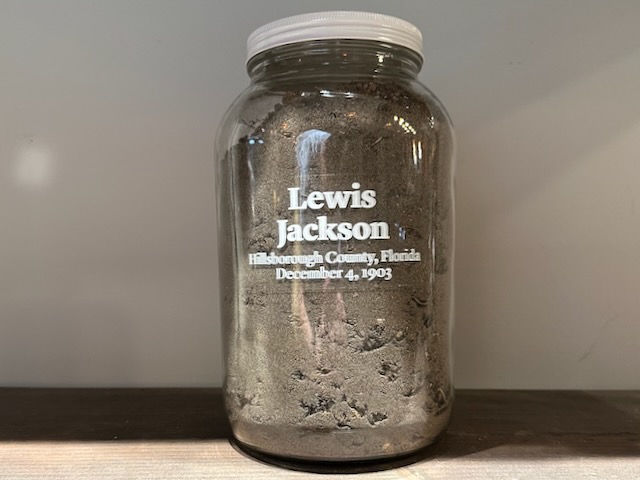At a fundraiser at the Portico Cafe1 Friday night, the Complimentary Spouse noticed something out of the corner of his eye and pointed at it.
“There are somebody’s ashes on that shelf.”
I looked and didn’t see an urn. “Where?” I asked.
“Right there.”
I looked again and saw what he was pointing at. It wasn’t an urn. It was a jar of dirt with a label on it. I recognized it instantly.
“Remember when we went to the Legacy Museum in Montgomery? They had a bunch of jars because they were collecting soil from every lynching site,” I said. “I’m sure that’s one of them.”
“Oh yeah,” Britt said. “I remember that.”
We moved closer. The label said:
Lewis Jackson
Hillsborough County, Florida
December 4, 1903
I asked the barista at the Portico Cafe if the jar was indeed part of the Equal Justice Initiative’s Soil Collection Project. She said yes, and added that a historical marker had just been put up at the actual site.
(The Soil Collection Project and Community Historical Market Project are two parts of EJI’s Community Remembrance Project. The Legacy Museum is just a few miles away from another EJI project, the iconic and moving National Memorial for Peace and Justice.2)
Seeing that soil filled me with sorrow, as it was a tangible reminder of our history of bigotry and violence. One hundred and twenty years later, our society is still cursed with those plagues, and a lot of the progress that has been made is being eroded.
But that jar also made me hopeful. It shows that people — well, not all people — don’t want to hide from the shame of the past. That leads to dialogue, and dialogue can lead to change.
Those who cannot remember the past are condemned to repeat it without a sense of ironic futility.
Errol Morris, filmmaker
These jars might make people uncomfortable, but discomfort is the only way we’ll evolve on these issues.
There’s pain in that soil, but without soil, nothing can grow.
___
1 The Portico Cafe is a coffee shop founded by a local Methodist church. It helps recovering addicts, people who were in jail, and others get second chances by giving them meaningful jobs. The revenue goes toward local homelessness initiatives.
2 This monument is powerful, disturbing, and essential. It records the individual victims of lynching while conveying the enormity of the violence.



